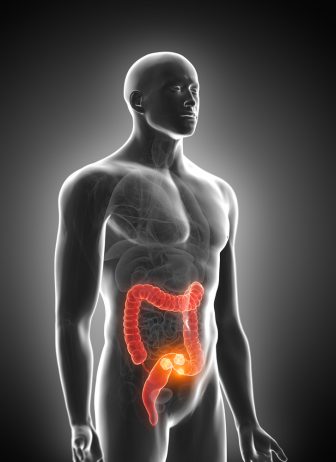Higher vitamin D levels cut colorectal cancer risk by 31%, major international study finds

- The report, led by the Harvard, adds weight to a theory which, until now, had not been proven
- Vitamin D is protective for all groups but particularly for women, they found
- Three quarters of Americans and a fifth of Brits are vitamin D deficient, and colorectal cancer rates are rising globally
- Vitamin D is hard to find in high concentrations in natural foods, but it can be ingested from fatty fish like salmon, cheese, fortified milk, and eggs
Higher vitamin D levels significantly drive down colorectal cancer risk, a large new international study has found.
The vitamin, found in fatty fish and sunshine, was found to strengthen resistance to stomach tumors by blocking a common gateway that cancer cells pass through - and it was most protective in women.
The report, led by the Harvard TH Chan School of Public Health, adds weight to a long-suspected theory which, until now, had not been proven.
It also suggested the ideal amount of vitamin D we should be aiming for may be higher than current guidelines suggest.
This study is yet another reminder to prioritize loading up on vitamin D, since around three quarters of Americans and a fifth of Brits are deficient - but while the vitamin is hard to find in natural foods, experts warn to scrutinize supplements that may not have been tested rigorously.
'In the past, substantial differences between assays made it difficult to integrate vitamin D data from different studies,' explained Regina G. Ziegler, PhD, a National Cancer Institute epidemiologist and co-senior author of the study.
'This calibration approach enabled us to systematically explore risk over the broad range of vitamin D levels seen internationally.'
The study was published online today in the Journal of the National Cancer Institute.
Previously, studies have been inconclusive about the cancer-fighting benefits of higher concentrations of circulating 25-hydroxyvitamin D, the accepted measure of vitamin D status.
There have only been a handful of randomized clinical trials on vitamin D supplements and colorectal cancer - none of which found a connection.
The authors of the new study say that may be because the studies were too small, the supplements weren't taken for long enough, or the subjects didn't fully comply - because now, they claim, they have the clearest evidence yet that there is a concrete link.
To find it, researchers conducted an analysis of more than 5,700 colorectal cancer cases and 7,100 controls from the United States, Europe, and Asia.
Compared to participants with circulating vitamin D concentrations considered sufficient for bone health, those with a vitamin D deficiency had a 31 percent higher risk of colorectal cancer during follow-up five years later.
Strong bone health, which is affected by vitamin D levels, was also associated with a 22 percent lower risk.
These links persisted even after adjusting for known colorectal cancer risk factors.
The protection was seen in all groups, but particularly in women.
The lifetime risk of colorectal cancer is 4.2 percent (one in 24) in women and 4.5 percent (one in 22) in men.
Colorectal cancer is the third most common cancer and third leading cause of cancer-related deaths in both men and women in the United States, with about 140,250 new cases and 50,630 deaths expected during 2018.
'Currently, health agencies do not recommend vitamin D for the prevention of colorectal cancer,' said Marji L. McCullough, ScD, American Cancer Society epidemiologist and co-first author of the study.
'This study adds new information that agencies can use when reviewing evidence for vitamin D guidance and suggests that the concentrations recommended for bone health may be lower than would be optimal for colorectal cancer prevention.'
http://www.dailymail.co.uk/health/article-5844189/Higher-vitamin-D-levels-cut-colorectal-cancer-risk-31-major-international-study-finds.html
